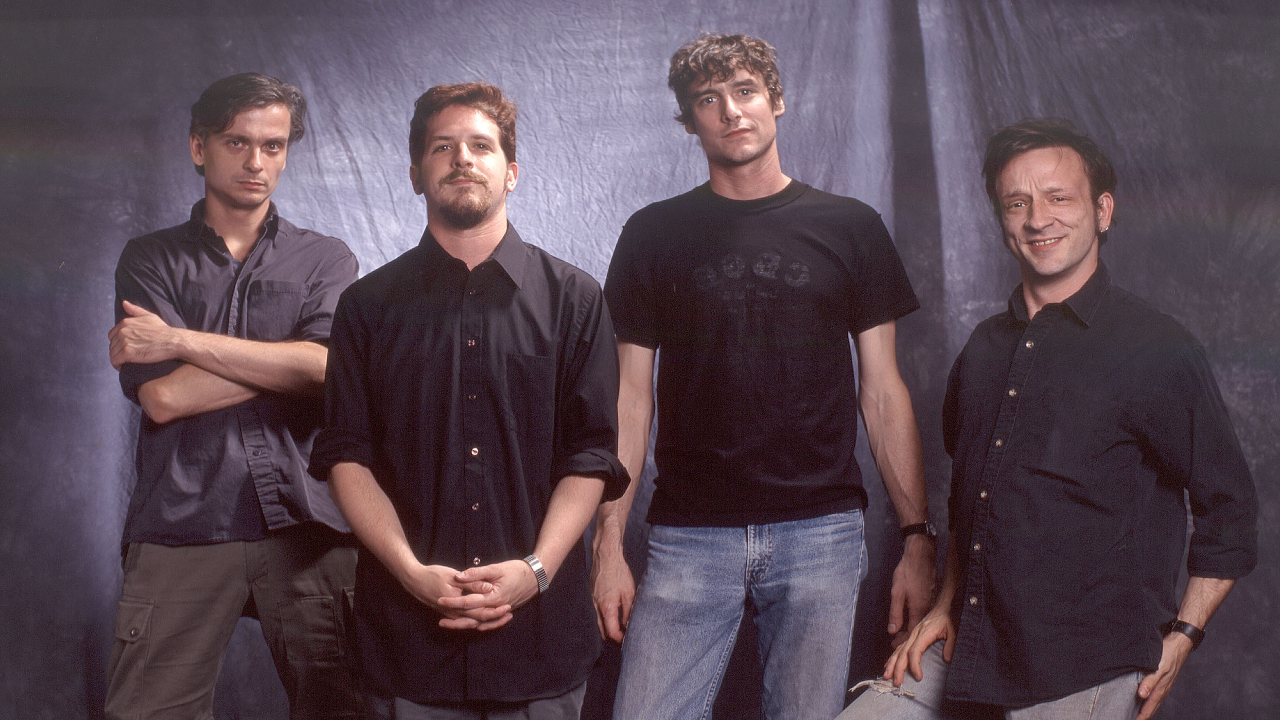Hailing from Chicago by way of Austin, Texas, The Jesus Lizard began life as a trio - vocalist David Yow, guitarist Duane Denison and bassist David Wm. Sims – armed with a drum machine. After recording the Pure EP in 1989, they recruited Mac McNeilly, and that’s when the band truly began to sizzle, creating a searing blend of angular punk and noise rock, with Denison’s penchant for jazz phrasing, topped off with Yow’s artfully slurred yelps and snarls.
The quartet recorded four albums for Chicago independent label, Touch and Go before signing, in the post-Nevermind alt. rock gold rush, with major label Capitol for two further albums, then splitting in 1999. Though their recording catalogue is exemplary, the stage is where The Jesus Lizard truly forged their reputation. While the band performed with a taut, unerring power, all eyes would be trained on a shirtless, often obnoxious Yow, who’d spend most of his time in the crowd or on the crowd, all without missing a word.
The band reunited in 2008 for a spate of reunion shows, and last played at the tail-end of 2019, but have no current plans to tour in the foreseeable future. To plug this miserable void in our world, we’ve ranked their studio albums – apologies to live albums Show and Club – from worst to best.

6. Down (1994)
You can trust Louder Our experienced team has worked for some of the biggest brands in music. From testing headphones to reviewing albums, our experts aim to create reviews you can trust. Find out more about how we review.
David Wm. Sims has described Down as “the worst album The Jesus Lizard made.” The bassist felt that the quartet were under-prepared when they entered the studio in 1994, and their relationship with producer Steve Albini had become fractious to say the least.
“The band – Sims and Denison at least – seemed detached and touchy, and at one point, Sims pointedly asked me to refrain from making any comments about the music,” remembers Albini in an honest, not wholly complimentary, essay in the band’s autobiography, Book. “It seemed no advice was welcome. The record took longer than their others to make , but struck me as weak by their standards. It was the first record of theirs that felt like work to me.”
It does lack the punch of their first three albums - Duane Denison revealed that the band were close to scrapping the recordings at one point - but Down is not the terrible album the band, or Albini, believe it to be. Far from it. Simmering opener Fly On The Wall, the dirty groove of Destroy Before Reading and the unsettling Countless Backs Of Sad Losers ("Dumb it down for the average Joe") hold up just fine almost 30 years later.
5. Head (1990)
Our Band Could Be Your Life author Michael Azerrad once noted that on The Jesus Lizard’s earliest releases, David Yow sounds like “a kidnap victim trying to howl through the duct tape over his mouth.” This approach only added menace to Yow's unhinged delivery, and accentuated the tension in their semi-legendary live shows.
But the frontman doesn’t simply yelp and snarl throughout their full-length debut. On the delicate Pastoral, his quiet vocal weaves its way through Denison’s melancholy guitar lines. “David recorded these vocals while he was so drunk, he didn’t remember recording it the next day,” remembers bassist Sims. Rest assured though, the likes of If You Had Lips, My Own Urine and Killer McHann uphold the pure filth quotient.
A solid debut, which merely hinted at what was to come.
4. Blue (1998)
Following the release of 1996's Shot, the demands of touring led Mac McNeilly to quit the band in order to raise his family, and the drummer was replaced by Denison/Kimball Trio man Jim Kimball for what proved to be their final album.
Gang Of Four guitarist Andy Gill produced their swansong, and as a result, Blue has more of an experimental bent, yet retains the crunch of their Touch and Go albums. I Can Learn, Eucalyptus and Needles for Teeth are awash with effects, and veer somewhat from their unique blueprint: in Book, Sims bluntly states of Needles For Teeth "This was a huge mistake, and should never have been released. David Yow calls this track 'a Trent Reznor abortion'." Ouch.
Much of Blue though is a polished version of the Lizard's trademark clatter and ferocity blended with Gill’s production, with the panicky Cold Water and the unhurried Until It Stopped To Die standout moments. The band performed their 'last' show in Umeå, Sweden in March 1999 and, after being let go from their Capitol contract, parted ways that summer.
3. Shot (1996)
After leaving Touch and Go, The Jesus Lizard signed with Capitol, a move which outraged some fans. Despite the sniping, Garth Richardson, the Canadian producer who had helmed Rage Against The Machine’s incendiary debut and Melvins’ sludge doom opus Houdini, helps give Shot a satisfying crunch that was missing from Down; it's their most accessible album and features some of their finest performances ever committed to tape.
Opener Thumper begins solidly, with an insistent, jabbing riff as Yow snarls “Glass idiot wrestle, you get me aroused” – nope, us neither – over the melee. On Shot, his vocals are up in the mix, capturing the power of his unorthodox delivery, together with some of his most unsettling lyrics. Sims – who says Shot is the best album he’s ever played on – says that Yow’s focus in the studio under Richardson’s was inspirational: “All the gorgeous demented ferocity is there, and now you can hear it; it doesn’t sound like he’s singing into a pillow.”
Elsewhere, Good Riddance slithers with purpose, with Yow examining a mental breakdown: “The clown became a jag off, full of mad hatred, full of repugnance”. And on the unsettling Mailman, he quietly intones the behaviour of a stalker and the letters they’d send to the object of their affections: “He wants to know if he can run his fingers through my hair. He also wants to know if he can hop around my hole.” And they say romance is dead.
2. Liar (1992)
As is the case with many bands incubated in the US Underground scene, the quartet's first post-Nevermind release is arguably their best known work.
Boilermaker begins with a shove in the chest and a punch in the gut. It’s named after a dive bar favourite, which is basically a shot of whisky dumped into a glass of beer. And like the cocktail, its effects are immediate. The Art of Self Defense is all crash and thrash, with Yow’s muffled growl detailing a nightmarish visit from a diminutive assassin: "A sad pygmy who takes small steps, who weeps while he snuffs you, who sits on your chest”. Christ.
The doom-laden Slave Ship grinds and pummels, while Puss – which featured on a split single with Nirvana’s Oh, The Guilt – boasts a something of a commercial hook, and reached number 12 in the UK singles chart. Rope, on the other hand, is a rockabilly knockabout. A cautionary tale about autoerotic asphyxiation, the song, apparently based on a true story, ends with the touching couplet: “Beneath a broken branch face down in the grass, no mason or bricklayer he, a trowel was in his ass.”
David Yow has since described Liar as a “step sideways” from Goat, and, for all intents and purposes, you could cut say it was from the same cloth. But to say the songs sound exactly the same would do them a disservice as it remains a highlight of their back catalogue. It’s a fabulous cloth, after all.
1. Goat (1991)
Recorded in late 1990 at Chicago Recording Company, The Jesus Lizard’s second full-length sees the band going at full throttle, aided and abetted by Steve Albini’s crisp, battering production. It’s confrontational and unpredictable, like a drunk who’s missed last orders. After the promise shown on their debut Head, everything clicks into place here.
There are highlights galore on this nine-track release. Opener Then Comes Dudley is measured and ominous, with Denison blending jazzy melodies and slurred, arpeggiated chord shapes over Sims’ brutish Duane Eddy-esque bass line and McNeilly’s metronomic beats. The brain-pummel continues on Mouthbreather, a frustrated paean to a well-meaning friend who winds up dead in Yow’s kitchen, while its “raining piss” in his basement. Could happen.
There’s the unsettling conversation of Nub, with Yow asking “Since the surgery, how's that ghost limb?” over frantic Denison’s swerving slide guitar, swiftly followed by the uneasy, off-kilter Seasick and Monkey Trick, led by Sims’ punchbag bass and maze-like riffs, and... oh, just listen to it all, and thank us later.
An essential, fabulous, life-changing album.

